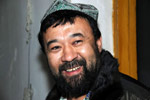Society
When holiday means overwork
Updated: 2011-01-31 11:03
(Xinhua)
BEIJING - With billions of Chinese workers leaving for family reunions, the Spring Festival bodes a bleak time for the country's industries and services. But for some jobs, with the holiday comes the busiest work and added responsibilities.
Ticket, Lozenge and Bandaid
The ticket-buying sprees during the Spring Festival travel rush have made stopping for drinking water a risky action for booking-office clerk Ma Rong.
For 12 hours a day, and nearly 30 days every year, Ma could not afford one minute to escape the inquiries, pleadings, and complaints of ticket buyers. At the rush hour, the queue for her window extended out of the station.
| ||||
A veteran ticket teller at the railway station of the northern municipality of Tianjin, Ma could handle a purchase within 60 seconds, but tickets for popular routes often sold out in minutes, leaving queuing passengers frustrated.
To work every minute, Ma substitutes water with throat lozenges to alleviate her sore throat, and her fingers were wrapped in Band-Aids after money counting left myriad cuts on them.
Not a moment of absentmindedness is allowed either, since "we're dealing with all kinds of accents and dialects," said Ma.
Traveling by train is favored by homebound Chinese due to its cheap price. The demand usually peaks before the Spring Festival, trapping ticket buyers in long lines and tellers in the need to overwork.
To cope with the seasonal flurry, the Beijing Railway Station has asked for help from college students eager to eke out their tuition, a ticket office director surnamed Yang told Beijing Evening News.
"It's no easy job, though. I once saw a newly recruited girl weep after passengers scolded her for being slow."
Under Fireworks, Work for Fire
Zhou Kai had mixed feelings towards festival firecrackers.
"As a child, I loved playing with those noisy explosives - the Spring Festival could be dull without firecrackers and the family dinner," said Zhou.
This was before he became a fire fighter in Beijing four years ago.
The Chinese celebrate the New Year by setting off fireworks and firecrackers, hoping the racket would expel evil spirits and bad luck. But this custom has made the festival season particularly turbulent and dangerous for Zhou, while depriving him of the chance to spend the night with his family.
"We spent every New Year Eve on highest alert and with our uniforms on," said Zhou, noting that fire cases involving firecrackers were reported every year.
Further, this year's unusually dry and windy winter has driven up the risk of fire in Beijing. Fire authorities have required all of the city' s 7,000 fire fighters stay on duty throughout the festival's fireworks nights.
"We usually prepared dumplings for the eve, but after putting out fires, we were left with cold ones," said Ma.
Ma said he was now considering getting a girlfriend.
But there was one problem - "I have to convince her to stay with my parents on New Year Eve," said Ma.
Specials

Spring Festival
The Spring Festival is the most important traditional festival for family reunions.

Top 10
A summary of the major events both inside and outside China.

A role model
Alimjan Halik had been selected as the "Cyberspace Personality Who Moved the Hearts of the Chinese in 2010".


